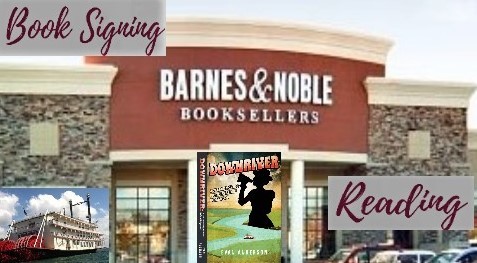Evan Anderson's Blog
February 19, 2020
"Downriver" on the Radio
Two different ways: At the upcoming Barnes & Noble reading we plan to have four readers, portraying different characters in the book, a'la “old time radio” (scripts and all, maybe even a microphone.) And, this Friday at 9:45 am – same day as the reading – I'll be a guest on Radio Kingston's “Warren in the Morning” show, talking about the book. https://radiokingston.org/ streaming live
Published on February 19, 2020 10:27
•
Tags:
booklaunch-bookreading-radio
February 4, 2020
Book Release Feb. 21st!

When: Friday, Feb. 21st, 7 pm
Where: Barnes & Noble. 1177 Ulster Ave., Kingston, NY
What: Reading and book signing for "Downriver"; followed by discussion on the role of women in the early film industry.
Even if you were at past local readings, please come! We'll be reading -- excuse me, dramatizing! -- scenes from the book that haven't been read before, with a crew of professional actors / readers to bring scenes to life. Kinda like old time radio! Heck, let's call it a second book release party...
Published on February 04, 2020 14:39
•
Tags:
book-release, film, historical-fiction, movies, signing, silent-film
July 31, 2019
In general release
The softcover edition, now in general release at Amazon.com
Reviews are in: “Compelling, entertaining reading... Absorbing character development...“Downriver” is a page turner... Rife with events echoing our present times....“Downriver” will make it's mark upon your heart!”
For a time, women had equal footing in the film industry. “Downriver: A Tale of Moving Pictures Before Hollywood” is about that time.
Upcoming events:
Sun, August 25th, 4 pm Inquiring Minds Bookstore, New Paltz
Wed. October 2nd 7 pm Port Ewen Library
Reviews are in: “Compelling, entertaining reading... Absorbing character development...“Downriver” is a page turner... Rife with events echoing our present times....“Downriver” will make it's mark upon your heart!”
For a time, women had equal footing in the film industry. “Downriver: A Tale of Moving Pictures Before Hollywood” is about that time.
Upcoming events:
Sun, August 25th, 4 pm Inquiring Minds Bookstore, New Paltz
Wed. October 2nd 7 pm Port Ewen Library

Published on July 31, 2019 12:33
July 27, 2019
"Downriver" new review
Excellent book! It brings together women of the cinema who paths may not hever never crossed-but should have, "Downriver A Tale of Pictures Before Hollywood" reminds me of E.L.Docterow's magnificent novel Ragtime-with a magnificence all it's own! I love this book because I love the movies and the history of this era. However even though you may not have an interest-initially-this will draw you in. The layer over layer of stories, movie history-don't let it pass you by. Downriver will make it's mark upon your heart! To get a copy of your own gives you a chance to let it speak to you over and over-like silent film speaks to you in your inner eye just like poetry makes you see farther, than you have ever seen before. Come on along -come on let's go Downriver where your adventure starts...Order your copy from Amazon.com - Diana MacIntyre- The Silents Majority
Published on July 27, 2019 08:20
July 25, 2019
"Downriver" launch 7/29
It's official! “Downriver's” print edition launches this coming Monday, July 29th on Amazon, Barnes & Noble and Target. Pre-orders welcome. Information on the local launch and readings in the Hudson Valley still to come. Stay tuned; welcome aboard!
Published on July 25, 2019 16:48
•
Tags:
historicalfiction
November 21, 2017
Nov. 19 review, Amaz. Kindle
Downriver, an U.S. historical novel from late 1800s to post WWI, moves from a Dickensian orphanage to river show boat to Kinemascopes before landing in the early days of the motion picture industry. Scrupulously researched, Anderson seamlessly melds historical figures poet Vachel Lindsey, first movie star, Florence Lawrence, and Alice Guy Blaché, an early woman film director with the adventures of his fictional protagonist Anne Blackstone. Lois Webber, Cecil B. DeMille, Pauline White, Chaplin and Mary Pickford have brief, delightful appearances, as well.
When runaway orphan, Anne, assists on a river showboat, she becomes enamored about plays and acting. Soon, she trades boat for train when she joins a producer showing roughly made motion pictures to railroad towns in the Midwest. Her duties as sound person—buzzing for mosquitoes, knocking together blocks of wood for horses, operating a wind machine—give a humorous look at early film production. In an upstart film company in St. Louis, she writes and directs her first script “The Orphan’s Revenge,” given in a delightful excerpt. Edison company reps try to halt their production with threats and bullying and thugs set afire the studio where she works revealing a dark history to film-making. When she meets the legendary poet Vachel Lindsey, who would become America’s best-known poet, she finds a movie fan, supporter and intermittent lover. Convincingly, he becomes part of the fictive world of Downriver.
From fake news stories planted by a motion picture company of the sad death of one of its stars to crowds rioting for contact with celebrities, the novel is rife with events echoing our present times. Certainly, chapters set in Fort Lee, New Jersey, the center of film production in the early 1900s, are intriguing. Anne becomes an au pair for Blaché at Solex films in Fort Lee in order to maneuver her way into another film job. One of the more stirring set pieces in the novel is the Army of Women’s Suffrage march down on 5th Avenue (“To the Women Give the Vote”) and Blaché’s speech at Columbia University encouraging women to become directors of film.
As the film industry moves to CA and WWI heats up, Anne gets an offer to make morale-building movies for the Army. In time, she sees the advent of movie “palaces” that serve shrimp cocktail and have rooms for child care.
Downriver is compelling, entertaining reading, and for anyone with an interest in the history of film, particularly women in film, it’s essential. For the most part, instances of film history are integral to plot. The novel is straight-forward, realistic depiction, but the occasional inclusion of samples of film scripts advance the plot is non traditional ways.
As testament to Anderson’s integration of fact and fiction, and absorbing character development, his fictive character Anne seems to have earned a place in the history of motion pictures by novel’s end.
When runaway orphan, Anne, assists on a river showboat, she becomes enamored about plays and acting. Soon, she trades boat for train when she joins a producer showing roughly made motion pictures to railroad towns in the Midwest. Her duties as sound person—buzzing for mosquitoes, knocking together blocks of wood for horses, operating a wind machine—give a humorous look at early film production. In an upstart film company in St. Louis, she writes and directs her first script “The Orphan’s Revenge,” given in a delightful excerpt. Edison company reps try to halt their production with threats and bullying and thugs set afire the studio where she works revealing a dark history to film-making. When she meets the legendary poet Vachel Lindsey, who would become America’s best-known poet, she finds a movie fan, supporter and intermittent lover. Convincingly, he becomes part of the fictive world of Downriver.
From fake news stories planted by a motion picture company of the sad death of one of its stars to crowds rioting for contact with celebrities, the novel is rife with events echoing our present times. Certainly, chapters set in Fort Lee, New Jersey, the center of film production in the early 1900s, are intriguing. Anne becomes an au pair for Blaché at Solex films in Fort Lee in order to maneuver her way into another film job. One of the more stirring set pieces in the novel is the Army of Women’s Suffrage march down on 5th Avenue (“To the Women Give the Vote”) and Blaché’s speech at Columbia University encouraging women to become directors of film.
As the film industry moves to CA and WWI heats up, Anne gets an offer to make morale-building movies for the Army. In time, she sees the advent of movie “palaces” that serve shrimp cocktail and have rooms for child care.
Downriver is compelling, entertaining reading, and for anyone with an interest in the history of film, particularly women in film, it’s essential. For the most part, instances of film history are integral to plot. The novel is straight-forward, realistic depiction, but the occasional inclusion of samples of film scripts advance the plot is non traditional ways.
As testament to Anderson’s integration of fact and fiction, and absorbing character development, his fictive character Anne seems to have earned a place in the history of motion pictures by novel’s end.
Published on November 21, 2017 13:10
•
Tags:
historical-fiction, movie-history, silent-film, women-directors, women-filmmakers
November 11, 2017
***** Review
Downriver: A Tale of Moving Pictures Before Hollywood
Let Anne Blackstone lead you right onto a showboat and into the historic beginnings of moving pictures.-Compelling and exciting!
By beth woronoff on November 10, 2017
Downriver opens up on a vivid world in which the heroine, Anne Blackstone has just lost her mother and has been captured by well meaning nuns and put into an orphanage where she must care for the younger children. Instead of giving into depression and self pity Anne works hard at her job, gains the trust of the nuns and finds an opportunity to escape. This is where the book truly takes off. Anne heads for the docks where her father a boat man used to spend time. She hears about a show boat about to leave with a vacancy. Anne shows up, speaks to the Director, makes up a plausible story of who she is and what her experience is and is accepted onto the boat. She has taken a leap of faith and the world has rewarded her. The rest of the novel shows Anne in one after another amazing situations where her confidence and nerve unfold first the world of a traveling Boat Theater and then the historic beginnings of film. A compelling read from beginning to end.
Let Anne Blackstone lead you right onto a showboat and into the historic beginnings of moving pictures.-Compelling and exciting!
By beth woronoff on November 10, 2017
Downriver opens up on a vivid world in which the heroine, Anne Blackstone has just lost her mother and has been captured by well meaning nuns and put into an orphanage where she must care for the younger children. Instead of giving into depression and self pity Anne works hard at her job, gains the trust of the nuns and finds an opportunity to escape. This is where the book truly takes off. Anne heads for the docks where her father a boat man used to spend time. She hears about a show boat about to leave with a vacancy. Anne shows up, speaks to the Director, makes up a plausible story of who she is and what her experience is and is accepted onto the boat. She has taken a leap of faith and the world has rewarded her. The rest of the novel shows Anne in one after another amazing situations where her confidence and nerve unfold first the world of a traveling Boat Theater and then the historic beginnings of film. A compelling read from beginning to end.
Published on November 11, 2017 09:02
•
Tags:
historical-fiction, movie-history, silent-film



